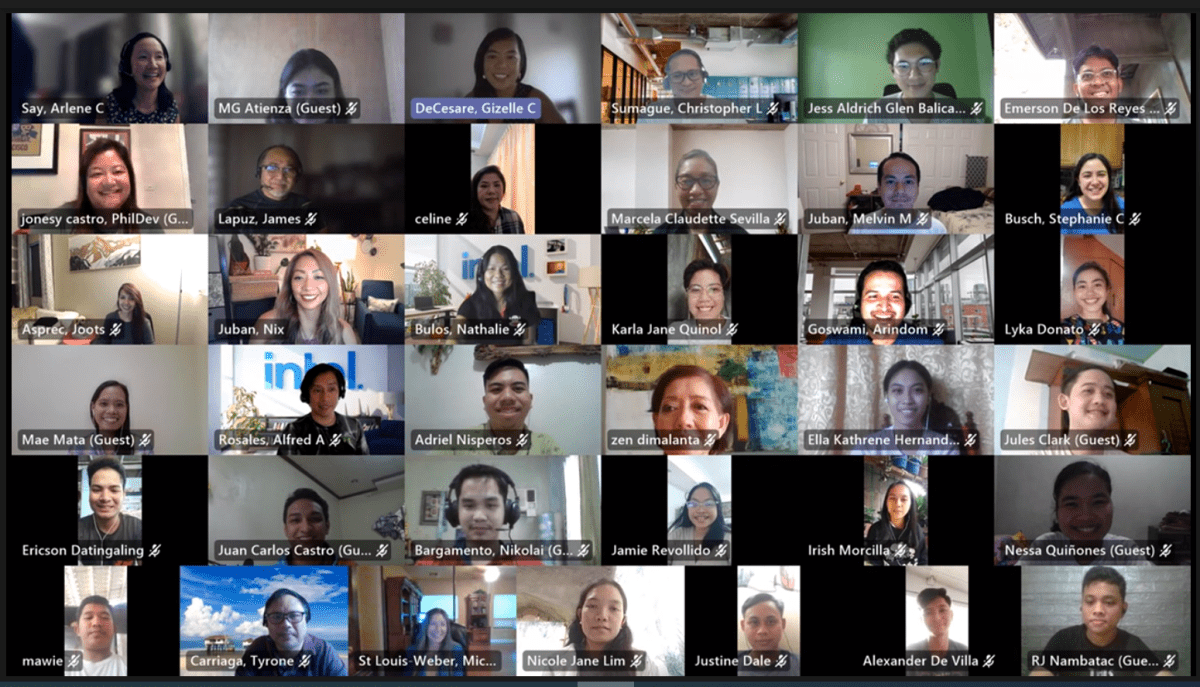By Adriel Nisperos
A constant and quite common feeling for graduating students is not knowing what to do next after finishing college. After acquiring much knowledge and skills, there’s still the terrifying uncertainty of what the future will hold. Worst case, this takes a toll on young people’s mental health. Questions linger in their minds at night, even amplified further by the pandemic.
“What’s next for me?”
“What career should I pursue?”
“Am I skilled enough to be part of the workforce?”
“Where should I start?”
“Why do I have to do all these things?”
“May crash course ba to adulting?”
The last thing we want at PhilDev is for our scholars to go through these same experiences. What we found is that it just takes one person who will listen to them and be a guiding post as they start the next stage of their lives.
With this in mind, we collaborated with the Intel Filipino Employee Network (IFEN) and launched the Mentoring and Uplifting Leaders as Aspiring Trailblazers (MULAT) program, a volunteer-based mentorship program designed to further enable our scholars to succeed academically, professionally, and personally. The program specifically aimed to build the skills and confidence of the scholars; and provide them with guidance and insights as they continue their academic journey or start their professional work.
“We want to use this COVID lockdown time as a way to build connections and mentorship support for the scholars and to make a positive impact on their lives. It may be virtual, but mentoring can encompass so many topics – be they technical skills or life skills,” shares Arlene Say, Global Supply Chain Category Manager at Intel and Co-Lead of the MULAT program.
Nathalie Bulos, Product Development Engineer at Intel and also a Co-Lead of the MULAT program, added that mentorship is highly encouraged in their workplace. In her experience, having a mentor reminds a person that they are not alone in the journey and that mentors can guide them in making career or life decisions. They wanted to replicate a similar impact of mentorship on the scholars through MULAT.
Forty-two scholars were matched with Intel employees who volunteered to become mentors. They were matched based on professional and academic backgrounds, mentoring topics with mentor skills, and interests. Both the scholars and mentors were committed to meeting virtually twice a month for the whole duration of the program.
Upskilling for the future
As a supplement to one-on-one mentorship, the MULAT program also provided opportunities for the scholars to upgrade their skills in areas they needed guidance on. The scholars have identified three key topics: (1) mental resilience; (2) personal finance; and (3) career building.
“We felt that learning isn’t just through one-on-ones. People have so many different ways of how they learn best, and it’s always best to reinforce and complement learning through different means so many times,” Arlene shared.
In the first forum, MULAT invited The Love Institute to discuss ways for students to stay mentally resilient. The session provided the scholars with practical tips on how to cope with stress and improve their overall mental well-being despite the challenges of learning remotely and balancing their responsibilities at home and in school. The second forum focused on the basics of managing their personal finance. PhilDev invited Ready2Adult PH to teach the scholars actionable strategies in saving, budgeting, goal-setting, and even investing. The third and last group forum revolved around preparing the scholars’ careers where volunteers from Intel shared their journeys, job interview tips, and ways to create effective resumés.
“These are the things that make you ‘Oh just tell me again what do I need to do!’ We own our own careers, a mantra that we learned here at Intel. Just like for our mentees, you own your own career journeys or academic success and accomplishments, but sometimes it just doesn’t stick,” Nathalie expressed.
(Re)learning together
Last September 10, IFEN and PhilDev marked the end of the pilot implementation of the MULAT program through a ceremony. Expressing their gratitude to their mentors, the scholars filmed themselves sharing the lessons they learned from their mentors and thanking them for their support.
Aljennica Kilantang, a scholar from the University of San Carlos, shared in a video how she was grateful to her mentor for being there for her as she faced life’s challenges, “Do you remember our first session? That was one of the lowest points in my life where I felt that I was running out of time because my batchmates were already working; they already have jobs.
I’m really glad that you were there to reassure me at that time and to listen to my stories. I’m so glad to have learned from your past experiences.”
Emerson Delos Reyes, a scholar from Batangas State University, reflected on the impact of the MULAT program on his self-esteem, “The MULAT mentorship program is an amazing opportunity to have [my skills] strengthened. Through process and constant practice, I can grow to a version 2.0 of me: an effective leader, best communicator, and someone who can turn his weaknesses into an amazing opportunity.”
Arlene and Nathalie both noted that the mentorship program was beneficial for them as much as it was for the scholars. They shared that they also learned lessons from their mentees and that the program provided them ways to stay connected and grounded despite the pandemic, “During the lockdown, even us, we felt that we needed more connections with people; so mentoring one-on-one helped build those connections.”
Arlene also shared a realization she made in one of her sessions with her mentee, “It’s funny because [my mentee] was the one who sort of reminded me ‘You’re too busy. You need to take time to relax also.’ When I was talking to him and asking what his plans were for the weekend, he said he has his thesis and this and that, but he also plans to go on a hike. That’s something that I thought, ‘Oh if he could do it despite having a part-time job and working on his thesis, I should be able to do that also.”
“Don’t be too hard on yourself ‘cause it’s a long journey. It’s a marathon.”
As parting words, Nathalie reminds the scholars to not be too hard on themselves, “We are so critical of ourselves, and we’ve given ourselves so many high expectations. Celebrate small victories ‘cause it matters. Don’t be too hard on yourself ‘cause it’s a long journey. It’s a marathon. That’s what I would say to my mentee or even to my younger self.”
On the other hand, Arlene advises the scholars to look at the bigger picture in life. “Sometimes we’re too focused on our own personal short term deliverables and challenges and we miss out on opportunities to do something good for others. When you take time to do something good for others, you indirectly benefit from it. It makes you feel grounded, inspired and you realize that the world is so much more than your worries and concerns. And you can do much by taking time to help others.”
IFEN completed a total of 305 hours of volunteer work throughout the MULAT program. Aside from rendering volunteer work, Intel will also be matching these hours with a donation to PhilDev as IFEN’s selected non-profit organization. These donations will then be used to continue PhilDev’s cause of supporting science and engineering students, creating a lifetime of positive impact to the scholars’ lives and to the future of the Philippines.
—
MULAT is part of the support services and activities of the PhilDev Science and Engineering Scholarship (PSES) program. If you’re interested in supporting our scholarship program through donations, visit our Support PhilDev page. If you would like to collaborate with us in supporting our scholars, email us at info@phildev.org.

